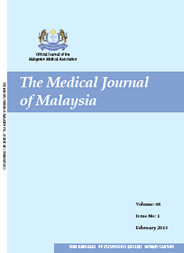MJM, Vol 70 Supplement 1 September 2015
Parents’ decision-making and access to measles
vaccination in Sarawak: a qualitative study
*Julius Centre University of Malaya, Department of Social and Preventive Medicine, Faculty of Medicine, University of Malaya, Kuala Lumpur, Malaysia, **Ministry of Health, Malaysia
ABSTRACT
Introduction: Since 2009, Malaysia has maintained a 95% national measles immunisation coverage as recommended by the World Health Organization, and is ready for measles elimination. However, in 2011, Malaysia suffered a nationwide outbreak of measles. 28% of measles sufferers were not vaccinated, denoting gaps in vaccine provision and outreach. This study aimed to explore parents’ perception and views on measles vaccination in Sarawak, as well as barriers to accessing vaccination service.
Methods: In-depth interviews were conducted in urban public clinics in Sarawak to explore parents’ decision-making and barriers in accessing measles vaccination service. Parents of children aged between 1 and 7 years, who defaulted measles vaccine for minimum 3 months were purposively sampled. Interviews were transcribed and coded using TAMSAnalyzer software. Thematic analysis was done to construct a coherent scheme. Ethical approval (NMRR-13-938-16913) and permission was obtained from the Ministry of Health.
Results: 12 defaulter parents were interviewed. Majority of parents were uninformed about measles and its consequences in unimmunised children. Decision to vaccinate was the end product of interaction between a parent’s personality, demographic characteristics, and previous medical encounters. For parents keen on vaccination, actual access to service was hampered by socio-politico-economic factors like financial and geographical barriers. Vaccine refusal and hesitancy were observed among well-educated parents, who expressed diminished trust in health authorities and increased desire to be respected for their autonomy.
Conclusion: Early engagement of hesitant parents in vaccine-related dialogue and addressing concerns about vaccine safety may be beneficial in improving public trust and vaccine uptake. For vulnerable populations, strong political and financial commitment is vital in improving access to vaccination.
Keywords: Measles; vaccination; decision-making; barriers.
